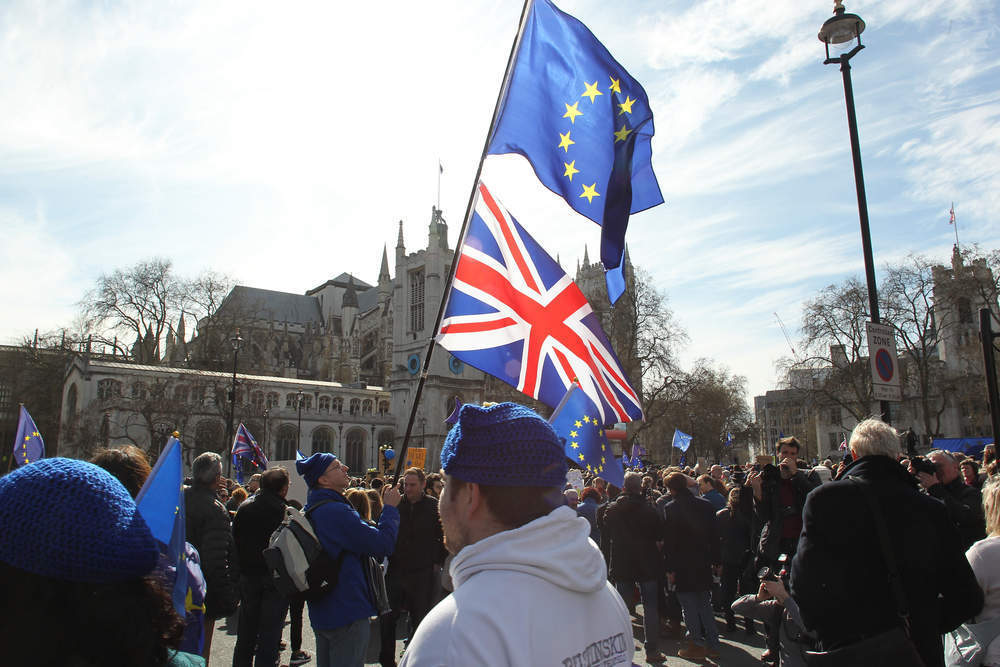
A wave of parties and campaigns calling for a second referendum on the final Brexit deal is sweeping Britain.
This raises the question: Is another referendum sanctioned under British law?
According to experts and lawyers, a second vote is possible under both a 2011 Parliamentary Act, the European Union Act of 2011, and under parliamentary law.
In autumn, the terms of the final Brexit deal will be voted on in the Houses of Parliament.
If parliament rejects the terms of the deal, or can’t agree on the terms, the decision could revert back to the people, potentially resulting in either another referendum or a general election.
A coalition of MPs and celebrities called Open Britain launched a new campaign under the banner ‘The People’s Vote’ on Sunday.
How well do you really know your competitors?
Access the most comprehensive Company Profiles on the market, powered by GlobalData. Save hours of research. Gain competitive edge.

Thank you!
Your download email will arrive shortly
Not ready to buy yet? Download a free sample
We are confident about the unique quality of our Company Profiles. However, we want you to make the most beneficial decision for your business, so we offer a free sample that you can download by submitting the below form
By GlobalDataThe campaign calls for the terms of a final deal to be put to the UK public.
Open Britain’s head of press, Adrian Mcmenamin told Verdict that its strategy is to get Britons to pressure their local MPs into rejecting the deal, so the decision has to be put to a referendum.
Mcmenamin said:
At this moment in time, there is not a majority in parliament for a people’s vote, so if people want there to be that vote, they must absolutely put pressure on their MPs to get it to happen. In the end, this is all in the hands of the people.
The campaign has MPs from the ranks of Labour, including Chuka Umunna, the Conservative’s Anna Soubry, as well as members of the Liberal Democrats and Green Party.
Mcmenamin added:
Part of our campaign is to win a majority of MPs in parliament to support our call for a people’s vote. Ultimately it will be up to parliament to decide.
The EU Act of 2011
If parliament does agree to the deal, there could still be a legal precedent for another public vote to be held in Brexit, said John Mahony, a lawyer and compliance officer specialising in EU law.
Section two of the UK’s European Union Act of 2011, says that any law that changes or replaces the Treaty on the Functioning of the European Union must be brought to a referendum, Mahony said.
As the deal would ultimately replace the current EU treaty it would need to be put to a referendum, according to Mahony.
The Treaty on the Functioning of the European Union (TOFEU) is one of the two central treaties on which the EU is based, along with the 1993 Maastricht Treaty.
Mahony said:
The European Union Act of 2011 Under Section 2 says that anything that amends or replaces the Treaty on the European Union or a function of the European Union must go to referendum. Now it depends on the way you interpret that.
If there is a deal on the table, you could argue that it’s a replacement and it does change the nature of the treaty with the European Union, as those will be taken away and a new one put on the table. So that would indicate that a new referendum is required.
There was a mandate given for leave. However, if there is a change of tack where something can’t be reached, or something has been reached which is fundamentally different, whereby they would stay in the Customs Union, that would not necessarily mean leaving the EU. So there would be a second vote could be instigated.
Only if there was no deal, or another referendum, would the final Brexit bill be exempt from a public vote under this law, Mahony said.
There are various reasons a second referendum could be called.
Under another scenario, parliament may not have the power to enact a deal without consulting their constituents first.
Mahony said:
If the deal is struck, then the nature of that deal might have to go to the people.
What would the referendum vote ask?
Most likely the phrasing of a referendum vote would be straight-forward, such as:
Do you accept the deal?
In this case, if the deal is rejected, the UK could face leaving without a deal, Mahony says.
The referendum could also ask what voters want to happen instead, and whether they want to keep the UK’s current relationship with the EU, or leave without a deal.
The wording of the referendum questions will ultimately determine what happens next, after the vote, if indeed it is held, Mahony said.
Could Brexit be cancelled?
If pro-Brexit campaigners, such as the Vote Leave campaign were found to have broken election law by exceeding campaign spending, for instance, this would unlikely derail the entire vote, according to Mahony.
The most likely scenario is that the treaty mandating a second vote (the European Union Act of 2011) will be interpreted very loosely, and the deal would be exempt, Mahony believes.
This is because the UK was given the permission to leave, so therefore parliament will rely on that right, Mahony concludes.
When asked if Brexit could be cancelled, he responded:
Technically speaking yes. If people want to remain as it is, then that question could be put [before a referendum].
Do people want a second referendum on Brexit?
More than half of the UK does want a vote on the final Brexit deal, a new survey by Open Britain revealed.
The poll conducted on 2,008 people with pollster Opinium Research found 52% of the UK support a vote on the final deal.
Around 31% of respondents say they were opposed to another vote, while 17% said they didn’t know or had no opinion.
Labour supporters most keen with 65% of supporters wanting a second referendum, and 21% against.
Broken down by country, people in England was most enthusiastic about a vote on the final deal with 52% supporting the idea.
Around 58% of people in Wales, 59% in Scotland and 45% of Northern Ireland were in favour on voting on the final Brexit deal.







